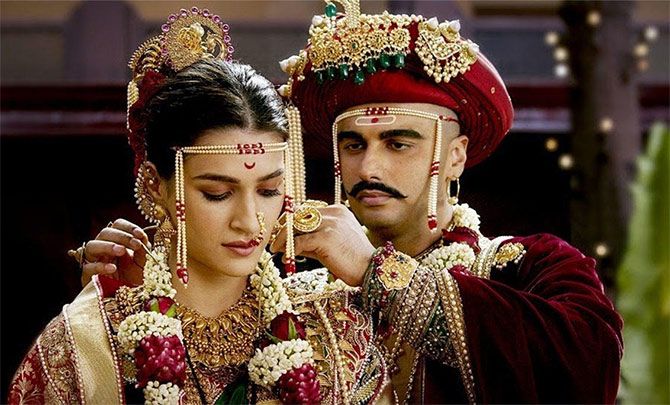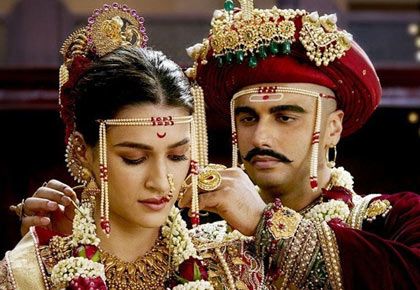'Panipat has all the meat for a political drama meets war movie. But in Ashutosh Gowariker's failure to process its complexity, the material never rises beyond a mediocre hurray to the Maratha manoos,' says Sukanya Verma.

When I was reading about the Third Battle of Panipat, what fascinated me most is the degree of ambition that drove both Maratha and Mughal imperialism. Even as the politics of desperate alliances and power mongering continues to repeat itself era after era, lessons are seldom learned.
There is wisdom to be found in defeat, but Ashutosh Gowarikar's Panipat appears too awestruck by the bravado on display to recognise the error and fallacy of human judgement.
What could be viewed as a cautionary tale on ill-equipped aggression, overbearing leadership, pernicious infighting and floundering diplomacy turns into a chest-thumping exercise for Maratha pride.
In Gowariker's lopsided view of the event and circumstances that led to the 18th century war, the Marathas are a patriotic lot determined to fulfil their vision of a unified India.
Their tendency to play solo and aloof relations with the Rajputs, Jats and Sikhs is largely ignored to focus on Afghan ruler Ahmad Shah Abdali's (Sanjay Dutt) ruthless trespassing. Instead of a formidable opponent, he is portrayed as a freak stabbing and crushing skulls like a mad mafia boss in an underworld movie.
Lured into reigning over Delhi by Najib-ud-Daula of the Rohillas, he baits the Marathas into a fight that would result in heavy number of causalities and destruction.
Except the man at helm here is essentially a fair-minded, reasonable film-maker known to point fingers at evils of discrimination and bigotry. Panipat struggles over its stand on Muslim portrayal in Hindi films, which tends to fluctuate between increasingly hostile to creepy caricature these days.
At times it almost sounds apologetic about the friction between the Marathas and the Mughals and goes out of the way to highlight Sadashiv Rao Bhau (Arjun Kapoor)'s secular moral fabric. But it is little more than lip service given how the narrative plays out, the treacherous Mughals and barbaric Afghanis want to wield control while the virtuous Marathas travel miles away from home in pursuit of pride and glory.
Both sides suffered serious loss of lives and strength, but all the sympathy is reserved for one side and aggrandising its heroics.
Speaking of which, the Maratha empire's third-in-command, Sadashiv Bhau makes a daredevil entry amidst heavy rain atop a human pyramid of red pagdis, trouncing the Nizam of Hyderabad and showing clemency to artillery expert Ibrahim Khan Gardi (Nawab Shah).
When the latter's religious identity raises eyebrows, Bhau reminds traitors aren't exclusive to any one community. Gardi is a crucial figure as is Vishwas Rao (Abhishek Nigam), son of Nana Saheb Peshwa (Mohinish Bahl). But their profile along with Bajirao's other son Shamsher (Sahil Salathia) is strictly one-note and confined to the backdrop. That's why you remain unmoved by their outcome in the climax. Gowariker just didn't pay enough attention.
In a shrewder drama, its blood ties to Sanjay Leela Bhansali's Bajirao Mastani, which depicted the previous generation, would have made for an interesting companion piece.
Having viewed that period in Bhansali's measure of opulence and Gowariker's own ideas of magnificence in Jodhaa Akbar, Panipat's splendour, despite extended scenes of pageantry and choreography, evoke a sense 'I've seen better.'
A good deal of Panipat's nearly three hours running time is dedicated to romantic overtures between Sadashiv Bhau and Parvati Bai (Kriti Sanon) in atrocious Marathi if not the domestic power play of a Peshwa queen's (Padmini Kolhapure is an easy fit, wish there was more of her) insecurity in manipulating Sadashiv and company into taking off to Delhi to ensure her son's claim to the throne.
As the spectator and narrator of Panipat's brutal history, Kriti is more than an emotional anchor in its predominantly masculine world. She even gets to show her skill with the sword and show off her savoir faire around Sakina Begum (Zeenat Aman) resulting in much-needed provisions.
While it is great to see the yesteryear star on big screen, there is nothing remarkable for her to do. Meanwhile, a radiant and spunky Sanon, save for those awful Marathi interjections, infuses the proceedings with a vibrancy it otherwise lacks. But her chemistry with Arjun Kapoor never hits a chord.
Neither does Kapoor's endeavour to play a man on the mission. There is visible effort on his part but the writing doesn't allow him to venture beyond upright to a fault. His character blames everyone for the fate they meet, but refuses to see his own role in the blunders and betrayals that follow.
Unwise decisions like traveling all the way to Delhi for combative tours with family and entourage are viewed in endearment. The difficulty of waging a war, depleting funds, intense starvation, wobbly alliances and volte face aides never reflect in Gowariker's feeble script.
Even the dialogues by Ashok Chakradhar, a distinguished literary figure fail to convey the fire in Maratha bellies or need for supremacy among Mughal forces.
A confused Dutt pops in and out to growl in fur-trimmed zardozi robes and staggeringly uneven characterisation. Reluctantly spearheading a war he doesn't quite care for, Abdali proposes truce and expresses admiration towards the valour he's up against yet his kohl-eyed, bald-headed menace adheres to the diktats of an '80s Bollywood villain.
There are intriguing shades in there, but Gowariker insists we see the two sides as black and white. So it is almost comical when he stops his army from fleeing the battleground and commands them to get back in class like a cross schoolteacher of pre-schoolers.
More unintended hilarity follows in Kunal Kapoor's portrayal of turncoat Shuja-ud-Daula. The occasional actor's husky baritone sounds a lot like grandfather Prithviraj Kapoor, but there is a flippancy in his tone that keeps you guessing whether he is mocking or dead serious. Considering how crucial he is to the crisis; the confusion doesn't help.
One of the most fascinating aspects of the Panipat story -- the alliances -- are depicted in the most lacklustre, cursory manner possible. The process of political negotiations and compromises in itself is so artful, there is little need to overstate things.
And even if it has to be dramatic, channel the eloquence in Aragon's persuasion of Rohan and Gondor's rulers to help him in the battle against Sauron.
Some scenes stand out -- the spyglass face off across Yamuna river, Parvati trying out the crown and feeling its sway or the final confrontation high on kinetic battle vigour until interrupted to zoom in on Kriti Sanon's shocked face or clumsy CGI-aided explosions.
Panipat has all the meat for a political drama meets war movie. But in Gowariker's failure to process its complexity, the material never rises beyond a mediocre hurray to the Maratha manoos.

Sukanya Verma is the Principal Movie Reviewer for Rediff.com.
One of the most perceptive observers of Hindi cinema, Sukanya has a dazzling portfolio of features that have engaged Rediff.com readers for 20 years.
She can be contacted at mailto_sukanyaverma@rediffmail.com











